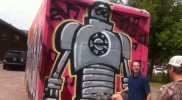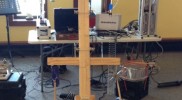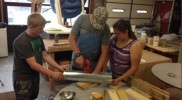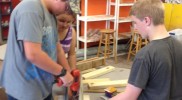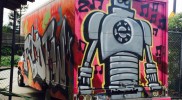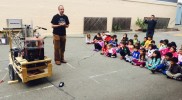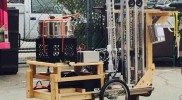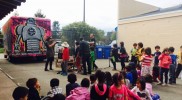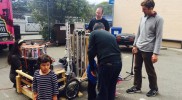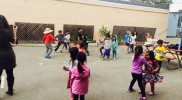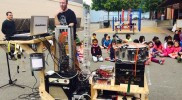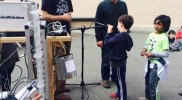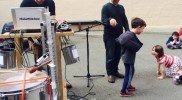- No products in the cart.
Making music with robots: workshops
workshopsuniversitiesmaker spaceshigh schoolsfor kidspress
Workshops on designing robotic musical instruments, composing music for robots, and making DIY handmade electronic instruments provide fun and engaging educational opportunities for students. Residing at the intersection of art and technology, the field of musical robotics appeals to a broad range of interests and can be used as a platform for learning about topics including:
Workshops can be tailored to suit particular needs, interests and time frames. Here are a few examples of workshop offerings: MNMade Festival 2015
MNMade Festival 2015
St. Cloud State University
St. Cloud, MN
Feb. 19-21, 2015
- music technology
- music composition
- musical instrument acoustics
- MIDI and other communication protocols
- interactive performance systems
- data sonification
- expressivity in music
- the history and development of automatic musical machines
- embedded systems
- Arduino and other microcontrollers
- sensors and actuators
- basic electronics
- musical instrument design
- kinetic sculpture
- fixed and parametric 3D design
- rapid prototyping technologies including 3D printing, CNC milling, and laser engraving
- various aspects of HRI (Human Robot Interaction) and HCI (Human Computer Interaction)
Workshops can be tailored to suit particular needs, interests and time frames. Here are a few examples of workshop offerings:
- a three hour workshop at which students get a basic introduction to musical robotics before trying their hand creating musical sketches for a robotic percussion ensemble with software and controllers
- a multi-day making music with robots workshop, at which students receive an intensive crash-course in musical robotics, collaboratively designing, building, and composing for a robotic instrument that remains with the host institution for future use after the concluding public concert of the workshop
- a multi-day workshop at which students compose new music for an ensemble of existing robots produced by Expressive Machines Musical Instruments (EMMI) and Troy Rogers, culminating in a concert and/or recording session
- a single workshop session at a makerspace or community art center which gives a hands-on introduction to the technologies utilized in musical robotics, such as microcontrollers, actuators, sensors, system design, rapid prototyping technologies, and software
- a one hour workshop which at which students receive an introduction to basic electronics while building a simple light-controlled synthesizer
These and many other options are possible. Browse through the tabs (above) for examples of workshops that have been offered at universities, makerspaces and community arts centers, high schools, and for kids. For further information, prices, and scheduling, use the contact form on this web site, or send an email to troy [at] expressivemachines [dot] [com]
Upcoming workshops
2015
Duluth MakerSpace
Duluth, MN
dates TBA
2016
Lyric Center for the Arts
Virginia, MN
Jan. 13-15, 2016
workshop + performance
Two Harbors High School
Two Harbors, MN
dates TBA
workshop + performance
MNMade Festival
St. Cloud State University
St. Cloud, MN
Feb. 22-27, 2016
workshop + performance
MacRostie Arts Center
Grand Rapids, MN
April 30, 2016
workshop + performance
Past workshops
2015
Headwaters School of Music and the Arts
Bemidji, MN
July 14-17, 2015
MASS Collective
Atlanta, GA
June 3, 2015
workshop
NIME (New Instruments for Musical Expression) 2015 International Conference
Louisiana State University
Baton Rouge, LA
May 31, 2015
Making Music with Robotic Instruments
NYC Resistor
Saturday, March 7, 2015 from 1:00 PM to 4:00 PM (EST)

The MNMade Festival at St. Cloud State University is a festival of handmade electronic music. In 2015, the festival featured two members of Duluth, MN’s Weirdo Industrial Complex: sonic wizard extraordinaire Tim Kaiser and composer, musical robot maker, and semi-nomadic robot herder Troy Rogers. Students created new robotic string instruments which were presented at the festival’s closing concert.
St. Cloud State University
St. Cloud, MN
Feb. 19-21, 2015
Making Music with Robots Workshops can be a great fit for academic programs in music, art, and engineering at both undergraduate and graduate levels. The format can range in duration and scope, from a 50-90 minute presentation as part of a regular course or guest lecture series, to a 2-4 hour workshop at which students get to interact and make music with robotic instruments, or as a full-fledged multiple day workshop at which students create new musical robots of their own and generate new music, performances, and/or recordings.
The focus can be tailored according to the curricular topics and needs of a course, studio, or department. For an introductory music technology course, this might mean using musical robots as a vehicle for introducing the MIDI protocol or exploring data mapping strategies, while for a composition studio, a group of musical robots can be brought in as a visiting ensemble to perform music composed by students. In an engineering program, the focus might tilt toward the practical design aspects of robotic musical instruments, while in an art studio the robots may be considered in the context of kinetic sculpture.
The inherently interdisciplinary nature of musical robotics can be harnessed to bring together students and faculty from multiple fields to incite collaborative outbreaks. This combined appeal has attracted the interest of educators and researchers across the US. Workshops of various types have recently been presented at Louisiana State University (as part of the NIME 2015 Conference), University of California Irvine, University of California Santa Barabara, Stanford University, University of Oregon, University of Idaho, Colgate University, Syracuse University, Oberlin College, and St. Cloud State University.
Examples of past workshops at universities:
MNMade Festival 2015
St. Cloud State University
St. Cloud, MN
Feb. 19-21, 2015
The focus can be tailored according to the curricular topics and needs of a course, studio, or department. For an introductory music technology course, this might mean using musical robots as a vehicle for introducing the MIDI protocol or exploring data mapping strategies, while for a composition studio, a group of musical robots can be brought in as a visiting ensemble to perform music composed by students. In an engineering program, the focus might tilt toward the practical design aspects of robotic musical instruments, while in an art studio the robots may be considered in the context of kinetic sculpture.
The inherently interdisciplinary nature of musical robotics can be harnessed to bring together students and faculty from multiple fields to incite collaborative outbreaks. This combined appeal has attracted the interest of educators and researchers across the US. Workshops of various types have recently been presented at Louisiana State University (as part of the NIME 2015 Conference), University of California Irvine, University of California Santa Barabara, Stanford University, University of Oregon, University of Idaho, Colgate University, Syracuse University, Oberlin College, and St. Cloud State University.
Examples of past workshops at universities:
NIME (New Instruments for Musical Expression) Conference
Louisiana State University
Baton Rouge, LA
May 31, 2015
Making Music with Robotic Instruments
Workshop Instructor(s):
Troy Rogers – Expressive Machines Musical Instruments
Steven Kemper – Music Department, Mason Gross School of the Arts, Rutgers, The State University of New Jersey
Scott Barton – Humanities and Arts Department, Worcester Polytechnic Institute
Part-day workshop: afternoon (1 – 4 PM)
Sunday, May 31, 2015
Digital Media Center, Room 1034
Workshop description:
Musical Robotics combines many of the technical skills relevant to NIME participants, including mechanics, electronics, hardware and software design, as well as musicality. In this half-day workshop, Expressive Machines Musical Instruments (EMMI) co-founders Troy Rogers, Scott Barton, and Steven Kemper will guide participants through a hands-on workshop that will focus on all areas of designing a robotic musical instruments. Using EMMI-designed kits, participants will build and program a simple percussion robot, as well as get a chance to compose a short piece for this new instrument. At the end of the workshop, all of the pieces will be shared in a mini-concert. In addition to the hands-on portion of the event, the presenters will discuss the history of robotic instruments as well as provide a survey of contemporary practitioners in the field. They will also discuss more advanced topics related to robotic instruments, including human-robot interaction, electroacoustic hybrid instruments, and compositional aesthetics.
St. Cloud State University
St. Cloud, MN
Feb. 19-21, 2015
The MNMade Festival at SCSU is a celebration of handmade electronic music. For the past two years it has played host to multi-day musical robotics workshops. These workshops have informed and inspired subsequent Making Music with Robots Workshops at other schools and venues. In 2015, students added a robotic string instrument to the previous year’s ELMRBOT robotic percussion ensemble. At the conclusion of MNMade 2015, composers Scott L. Miller and Troy Rogers and percussionist Terry Vermillion presented improvisations with the robots created by students as well as existing robotic instruments created by Rogers and Expressive Machines Musical Instruments (EMMI).
The current proliferation of robotic musical instruments and devices can be traced in part to activities at the intersection of music technology and the DIY resurgence inspired by the maker movement. Technology-friendly community work spaces, whether identified as art centers, hackerspaces, or makerspaces, make ideal settings for musical robotics workshops. While fully equipped workshops with high end CNC milling machines, 3D printers, and laser engravers can most definitely enhance the workshop experience (and in fact, musical robotics workshops can be a great way to showcase and educate about such tools), a space that can accommodate light fabrication and a bit of sometimes repetitive noise making is all that is required. The RoboRig is fully outfitted with hand and power tools, electronics gear and parts, instrument building materials, and a 3D printer.
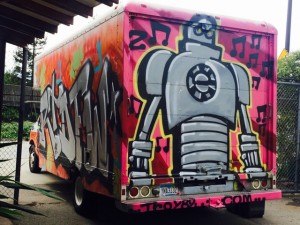

The RoboRig is a fully equipped mobile platform for the dissemination of early 21st century semi-nomadic robot herders musical making activities. Serving as a mobile workshop, touring van, and living space, the vehicle is equipped with a wide range of tools and materials for performances and musical robotics workshops.
Examples of past workshops at community art centers and makerspaces:
Making Music with Robotic Instruments
NYC Resistor
Saturday, March 7, 2015 from 1:00 PM to 4:00 PM (EST)
About the Making Music with Robotic Instruments at NYCResistor workshop:
This workshop was geared towards NYC Resistor community members with an interest in learning more about designing, building, and composing for robotic musical instruments. Basic understanding of electronics, programming, computer music, or composition proved helpful (but not a necessary prerequisite) and no other specialized knowledge was assumed. Some participants brought laptops pre-loaded with Arduino IDE, software capable of generating MIDI, or provided instruments andfound objects they wanted to automate.
Participants worked with a preassembled electronics kit created by EMMI, which helped to minimize assembly and maximize play time for the workshop. Small screwdrivers, pliers, wire strippers, multimeters, soldering irons and other basic electronics assembly tools and materials were provided by NYC Resistor. Unassembled robotic electronics and actuator kits created by EMMI were available for purchase at a discounted price ($100-350, depending on options) to workshop participants.
Following the workshop session one participant took ideas and techniques from the workshop and developed them further, creating a plant-controlled set of robotic bongos and documenting his project on the web. Inspiring work, Kirk! Check out his blog post about the project and the video below:
MASS Collective
Atlanta, GA
June 3, 2015
workshop
STEM, or “Science, Technology, Engineering, and Mathematics” education is a hot topic lately with teachers, administrators, industry leaders, and parents. While the incentives and benefits for expanding such curricular offerings in US schools is widely recognized, many artists and STEM enthusiasts alike agree that this should not come at the expense of arts and humanities education. This notion has prompted a call from both artistic and technical spheres to add an “A” for “Arts” into the acronym, converting “STEM” into “STEAM” education. Making Music with Robots Workshops provide a unique STEAM educational opportunity to high school students.
The most popular workshop format for high school students has been a multiple day workshop. Over the course of several days, workshop participants learn about the art of musical robotics and its connection to creative music-making technologies and endeavors of the past and present. They rapidly put this new knowledge to use by collaborating to build a new robotic percussion ensemble and making new music for the freshly created instruments. At the conclusion of each workshop, the new musical robots are unveiled to the public in a performance, typically featuring a local guest musician.
Grants and other funding are often available to cover workshop costs. The Headwaters School for Music and the Arts secured a grant from the regional arts council to bring the workshop to their school in July 2015. A Community Arts Learning Grant from the Arrowhead Regional Arts Council (ARAC) is providing funding for upcoming workshops in Duluth, Virginia, and Two Harbors, MN.
Examples of recent high school musical robotics workshops:
Robotics and Composition Camp
Headwaters School of Music and the Arts
Bemidji, MN
July 14-17, 2015
Musical robotics demos and workshops catered to kids offer a fun, educational respite from the ordinary. A great way to introduce young people to STEAM education, music technology, music composition, and robotics. Or just a great excuse for a mid-day robot dance party.
Examples of kid-focused musical robotics workshops and activities:
American International Montessori School
Berkeley, CA
May 19, 2015
Examples of kid-focused musical robotics workshops and activities:
American International Montessori School
Berkeley, CA
May 19, 2015
Experimental Garage Sale
Experimental Sound Studio
Chicago, IL
June 7, 2015
A father and his daughter team up to control a group of percussion robots:
Media coverage of making music with robots workshops
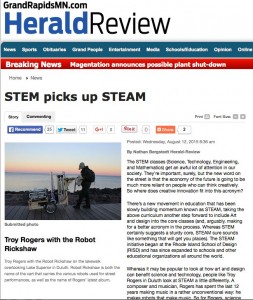
“STEM picks up STEAM,” Grand Rapids Herald Review, August 12, 2015.

An article in the Grand Rapids Herald Review about upcoming Making Music with Robots workshops conducted by composer Troy Rogers as an example of STEAM (Science, Technology, Engineering, Arts, Mathematics) educational opportunities that promote creative learning and creative innovation.
Making Music with Robots Workshop and Performance coverage, WDIO Television, Duluth, MN
“Musical Robots with Troy Rogers” on KAXE Northern Community Radio, 10:49 audio segment produced and broadcast July 17, 2015. Discussing the making music with robots workshop for high school students at the Headwaters School of Music and the Arts in Bemidji, MN with the school’s Executive Director Katie Carter.
A wonderfully descriptive and image-rich post by TheTravellersTwo.com, who met up with the robots during a presentation at Fort Houston in Nashville Tennessee. June 28, 2015.
MNMade Festival Celebrates Electronic Instruments. WJON, St. Cloud, MN, February 20, 2015:
MN Made: New Music Festival 2014
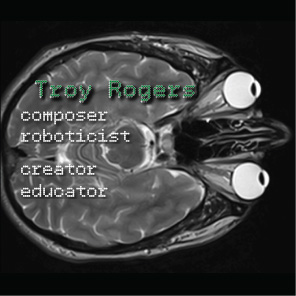
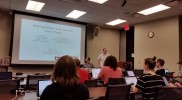

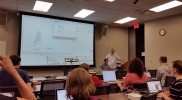
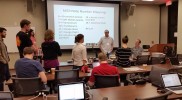
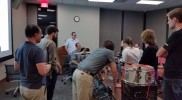
 (@allthatsmash) on
(@allthatsmash) on 